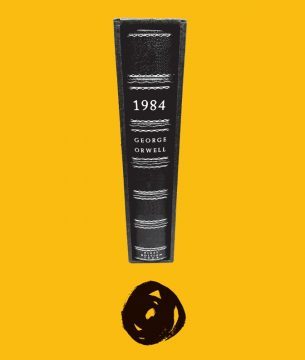George Packer in The Atlantic:
 No novel of the past century has had more influence than George Orwell’s 1984. The title, the adjectival form of the author’s last name, the vocabulary of the all-powerful Party that rules the superstate Oceania with the ideology of Ingsoc—doublethink, memory hole, unperson, thoughtcrime, Newspeak, Thought Police, Room 101, Big Brother—they’ve all entered the English language as instantly recognizable signs of a nightmare future. It’s almost impossible to talk about propaganda, surveillance, authoritarian politics, or perversions of truth without dropping a reference to 1984.Throughout the Cold War, the novel found avid underground readers behind the Iron Curtain who wondered, How did he know?
No novel of the past century has had more influence than George Orwell’s 1984. The title, the adjectival form of the author’s last name, the vocabulary of the all-powerful Party that rules the superstate Oceania with the ideology of Ingsoc—doublethink, memory hole, unperson, thoughtcrime, Newspeak, Thought Police, Room 101, Big Brother—they’ve all entered the English language as instantly recognizable signs of a nightmare future. It’s almost impossible to talk about propaganda, surveillance, authoritarian politics, or perversions of truth without dropping a reference to 1984.Throughout the Cold War, the novel found avid underground readers behind the Iron Curtain who wondered, How did he know?
It was also assigned reading for several generations of American high-school students. I first encountered 1984 in 10th-grade English class. Orwell’s novel was paired with Aldous Huxley’s Brave New World, whose hedonistic and pharmaceutical dystopia seemed more relevant to a California teenager in the 1970s than did the bleak sadism of Oceania. I was too young and historically ignorant to understand where 1984 came from and exactly what it was warning against. Neither the book nor its author stuck with me. In my 20s, I discovered Orwell’s essays and nonfiction books and reread them so many times that my copies started to disintegrate, but I didn’t go back to 1984. Since high school, I’d lived through another decade of the 20th century, including the calendar year of the title, and I assumed I already “knew” the book. It was too familiar to revisit.
More here.
